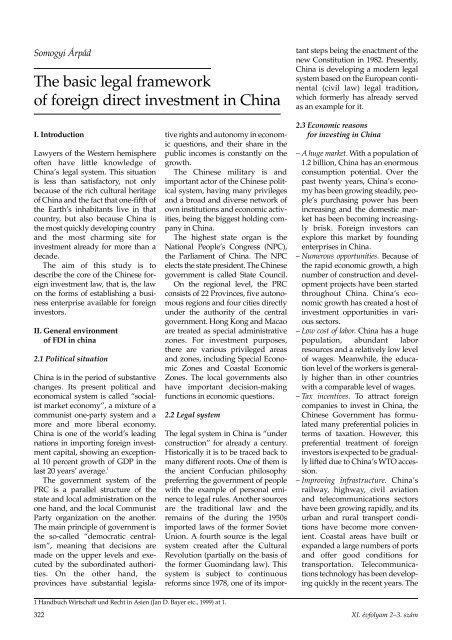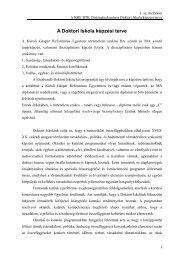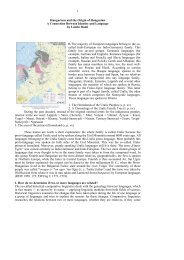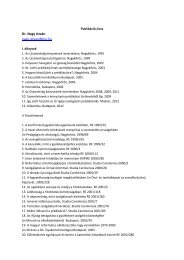collega - Károli Gáspár Református Egyetem
collega - Károli Gáspár Református Egyetem
collega - Károli Gáspár Református Egyetem
You also want an ePaper? Increase the reach of your titles
YUMPU automatically turns print PDFs into web optimized ePapers that Google loves.
Somogyi Árpád<br />
The basic legal framework<br />
of foreign direct investment in China<br />
The legal system in China is “under<br />
construction” for already a century.<br />
Historically it is to be traced back to<br />
many different roots. One of them is<br />
the ancient Confucian philosophy<br />
preferring the government of people<br />
with the example of personal eminence<br />
to legal rules. Another sources<br />
are the traditional law and the<br />
remains of the during the 1950s<br />
imported laws of the former Soviet<br />
Union. A fourth source is the legal<br />
system created after the Cultural<br />
Revolution (partially on the basis of<br />
the former Guomindang law). This<br />
system is subject to continuous<br />
reforms since 1978, one of its important<br />
steps being the enactment of the<br />
new Constitution in 1982. Presently,<br />
China is developing a modern legal<br />
system based on the European continental<br />
(civil law) legal tradition,<br />
which formerly has already served<br />
as an example for it.<br />
I. Introduction<br />
Lawyers of the Western hemisphere<br />
often have little knowledge of<br />
China’s legal system. This situation<br />
is less than satisfactory, not only<br />
because of the rich cultural heritage<br />
of China and the fact that one-fifth of<br />
the Earth’s inhabitants live in that<br />
country, but also because China is<br />
the most quickly developing country<br />
and the most charming site for<br />
investment already for more than a<br />
decade.<br />
The aim of this study is to<br />
describe the core of the Chinese foreign<br />
investment law, that is, the law<br />
on the forms of establishing a business<br />
enterprise available for foreign<br />
investors.<br />
II. General environment<br />
of FDI in china<br />
2.1 Political situation<br />
China is in the period of substantive<br />
changes. Its present political and<br />
economical system is called “socialist<br />
market economy”, a mixture of a<br />
communist one-party system and a<br />
more and more liberal economy.<br />
China is one of the world’s leading<br />
nations in importing foreign investment<br />
capital, showing an exceptional<br />
10 percent growth of GDP in the<br />
last 20 years’ average. 1<br />
The government system of the<br />
PRC is a parallel structure of the<br />
state and local administration on the<br />
one hand, and the local Communist<br />
Party organization on the another.<br />
The main principle of government is<br />
the so-called “democratic centralism”,<br />
meaning that decisions are<br />
made on the upper levels and executed<br />
by the subordinated authorities.<br />
On the other hand, the<br />
provinces have substantial legislative<br />
rights and autonomy in economic<br />
questions, and their share in the<br />
public incomes is constantly on the<br />
growth.<br />
The Chinese military is and<br />
important actor of the Chinese political<br />
system, having many privileges<br />
and a broad and diverse network of<br />
own institutions and economic activities,<br />
being the biggest holding company<br />
in China.<br />
The highest state organ is the<br />
National People’s Congress (NPC),<br />
the Parliament of China. The NPC<br />
elects the state president. The Chinese<br />
government is called State Council.<br />
On the regional level, the PRC<br />
consists of 22 Provinces, five autonomous<br />
regions and four cities directly<br />
under the authority of the central<br />
government. Hong Kong and Macao<br />
are treated as special administrative<br />
zones. For investment purposes,<br />
there are various privileged areas<br />
and zones, including Special Economic<br />
Zones and Coastal Economic<br />
Zones. The local governments also<br />
have important decision-making<br />
functions in economic questions.<br />
2.2 Legal system<br />
2.3 Economic reasons<br />
for investing in China<br />
– A huge market. With a population of<br />
1.2 billion, China has an enormous<br />
consumption potential. Over the<br />
past twenty years, China’s economy<br />
has been growing steadily, people’s<br />
purchasing power has been<br />
increasing and the domestic market<br />
has been becoming increasingly<br />
brisk. Foreign investors can<br />
explore this market by founding<br />
enterprises in China.<br />
– Numerous opportunities. Because of<br />
the rapid economic growth, a high<br />
number of construction and development<br />
projects have been started<br />
throughout China. China’s economic<br />
growth has created a host of<br />
investment opportunities in various<br />
sectors.<br />
– Low cost of labor. China has a huge<br />
population, abundant labor<br />
resources and a relatively low level<br />
of wages. Meanwhile, the education<br />
level of the workers is generally<br />
higher than in other countries<br />
with a comparable level of wages.<br />
– Tax incentives. To attract foreign<br />
companies to invest in China, the<br />
Chinese Government has formulated<br />
many preferential policies in<br />
terms of taxation. However, this<br />
preferential treatment of foreign<br />
investors is expected to be gradually<br />
lifted due to China’s WTO accession.<br />
– Improving infrastructure. China’s<br />
railway, highway, civil aviation<br />
and telecommunications sectors<br />
have been growing rapidly, and its<br />
urban and rural transport conditions<br />
have become more convenient.<br />
Coastal areas have built or<br />
expanded a large numbers of ports<br />
and offer good conditions for<br />
transportation. Telecommunications<br />
technology has been developing<br />
quickly in the recent years. The<br />
1 Handbuch Wirtschaft und Recht in Asien (Jan D. Bayer etc., 1999) at 1.<br />
322 XI. évfolyam 2–3. szám

















